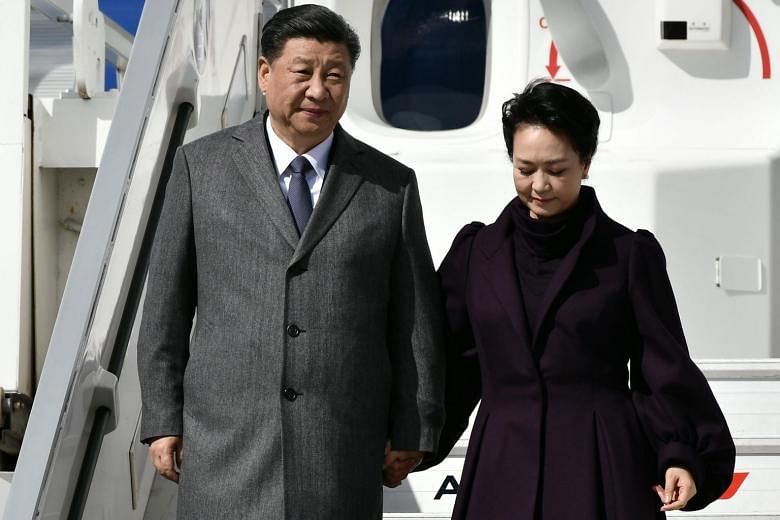PARIS (REUTERS) - France and China will sign trade deals worth billions of euros on Monday (March 25) during a visit by Chinese President Xi Jinping, but Paris will also take the opportunity to push back against Beijing's "Belt and Road" infrastructure initiative.
President Emmanuel Macron wants to forge a united European front to confront Beijing's advances.
After he and Mr Xi meet later on Monday, the two will hold further talks on Tuesday with German Chancellor Angela Merkel and Mr Jean-Claude Juncker, the head of the EU executive.
Mr Xi arrived in France after visiting Italy, the first Western power to endorse China's ambitious Belt and Road Initiative as Rome tries to revive its struggling economy.
The Belt and Road Initiative plan, championed by Mr Xi, aims to link China by sea and land with South-east and Central Asia, the Middle East, Europe and Africa, through an infrastructure network on the lines of the old Silk Road.
France says Silk Road cooperation must work in both directions.
An official in Mr Macron's office said significant progress was expected in terms of opening up the Chinese market for some farm goods, especially poultry.
French officials have also expressed the hope that a multi-billion dollar deal for China to buy dozens of Airbus planes could be finalised.
In a column in Le Figaro published on Sunday, Mr Xi made clear he wanted Paris to cooperate in the Belt and Road project, calling for more trade and investment in sectors ranging from nuclear energy and aeronautics to agriculture.
"French investors are welcome to share development opportunities in China. I also hope that Chinese companies can do better in France and make a greater contribution to its economic and social development," he wrote.
French officials describe China as a both a challenge and partner, saying France must remain especially vigilant over any Chinese attempts to appropriate foreign technology for its own means.
The EU is already weighing a more defensive strategy on China, spurred by Beijing's slowness in opening up its economy, Chinese takeovers in critical sectors, and a feeling in European capitals that Beijing has not stood up for free trade.
"An awakening was necessary," Mr Macron said in Brussels on Friday. "For many years we had an uncoordinated approach and China took advantage of our divisions."
As part of efforts to push that approach, Mr Macron will host Dr Merkel and Mr Juncker on Tuesday to meet with Mr Xi to move away from a purely bilateral approach to ties.
"Macron is not happy to see China win so many prizes in Rome, so he has invented a bizarre European format by inviting Merkel and Juncker as a counterbalance to show that he is the driving force behind European integration," said one Paris-based Asian diplomat.

